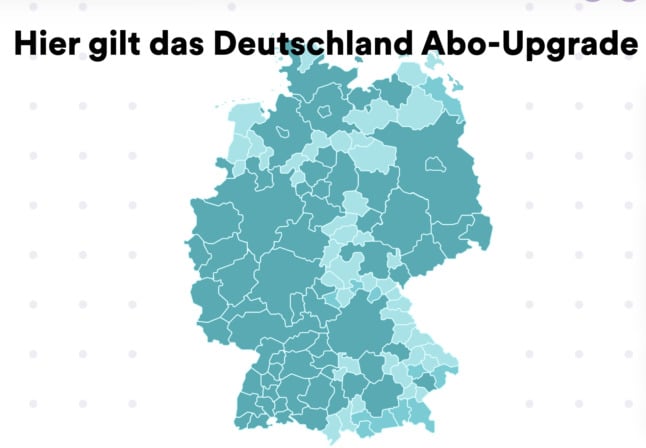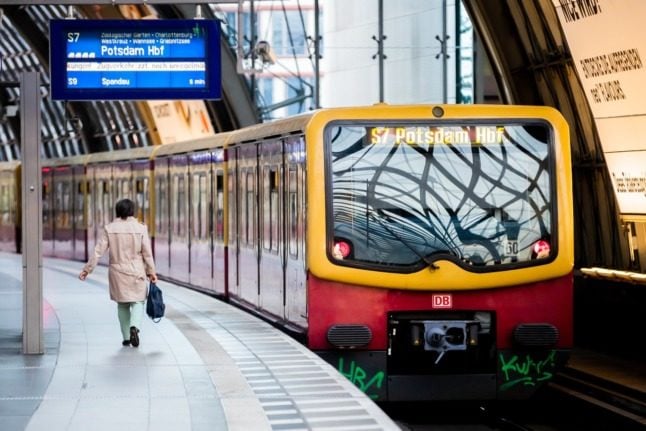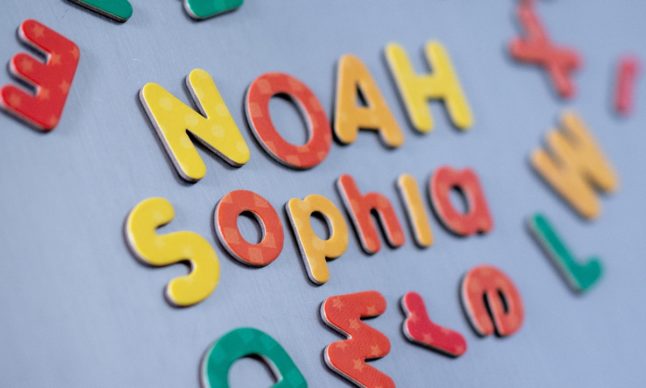A host of local public transport providers have joined together for the ‘Deutschland Abo-Upgrade’. The promotion, which runs until September 26th, makes free travel possible on local transport networks throughout Germany for people who have a monthly or annual ticket.
Here’s a look at what you should know.
Who is eligible and how can I participate?
Customers of lots of public transportation companies across the country who have a valid season ticket are eligible to participate. Abo customers with an annual pass are included, as well as people with a special travel pass, such as a student Semesterticket, a senior citizen’s transport pass – or from their employers. However, it’s unclear whether everyone with a Sozialticket from the Job Centre is eligible for the offer. They are urged to check with their local transport provider to find out if they can take part.
If you’re interested, you can register online free of charge on the campaign’s homepage to receive the upgraded ticket.
The time restrictions of some subscription offers, such as the ticket being valid only after 9am, are not excluded from this promotion. It also means that you can travel at any time if you have this ticket. The only thing to note is whether the relevant transport association is taking part in the special ticket upgrade.
READ ALSO: German public transport slammed as ‘failure’ as half of user turn to car
“After you register, you will receive your upgrade ticket via email. In combination with your valid season ticket, you’ll be able to use more than 95 percent of the local transport services across Germany from September 13th to 26th 2021 at no additional cost,” said the Abo-Upgrade organisers.
In most places involved you can ride for free on the U-Bahn, bus, trams, trains and regional trains.
Where can I travel for free?
The free travel only applies for local networks so long-distance trains (EC/IC/ICE) are not included. But you can travel for free on the public transport network in places such as Hamburg, Berlin and Brandenburg, Munich, the Nuremberg area as well as in the Frankfurt area. The places taking part are coloured in dark green below in the map.

Using local trains you could travel, for instance, from Hamburg to Sylt in three hours, or from Munich to Garmisch in just over an hour.
A trip from Magdeburg to Hamburg takes just under three hours (with one change of trains), or a direct connection from Magdeburg to Berlin takes less than two hours.
Traveling south, on the other hand, is more difficult since cities like Nuremberg or Munich are primarily served by ICE connections.
But you could, for instance, pay for an ICE train to Munich from Berlin – but travel for free in the Munich area when you arrive.
You can find out more about who’s taking part on the Abo promotion homepage, and for any other regulations.
READ ALSO: Why this German city plans to make public transport free
Why is it happening?
According to local transport providers throughout Germany, the promotion is a “thank you” to regular customers for not cancelling their monthly and annual passes after a year and a half of the Covid pandemic.
And the association wants to draw attention to the precarious situation of public transport. Currently, transport companies nationwide are recording about 15 percent fewer subscription ticket holders than at the end of 2019.
“The second, very long lockdown from November 2020 to March 2021 has hit public transport much harder than we thought, especially with the decline of subscription tickets,” said Lars Wagner, spokesman of the Association of German Transport Companies (VDV).
More people working form home as well as fewer events and appointments have put extreme pressure on passenger numbers. This will likely change people’s mobility in the long term, Wagner suspects. “Up to and including 2019, we had 22 consecutive years of passenger records. That’s been over for a year and a half,” Wagner said.
Anything else I should know?
You can’t apply the transport regulations for your Abo to another area’s region.
So it’s not possible, for example, to take another person with you free of charge, even if this is possible in your own region.
Meanwhile, anyone who wants to save money on rail travel after the end of the promotion has the option of purchasing a discounted trial Bahncard 25 for €9.90 instead of €17.90. After registering, customers will receive an eCoupon that can be redeemed when ordering a Bahncard on bahn.de.
The trial Bahncard is valid for three months and even after the promotional period has expired.
Why can’t free local travel happen all the time?
Good question. It’s one that many people are asking, particularly because it makes getting a long-term public transport ticket more attractive as we try to fight climate change.
Transport expert Annette Stolle from Deutsche Umwelthilfe (DUH), told Spiegel she welcomes a change in the way that public transport works in Germany.
For several years, DUH has been calling for the so-called Blue Ticket: for €365 a year – €1 a day – a passenger would be able to travel not only by bus and train in your local transport association, but nationwide on local transport.
The advantages are obvious, said Stolle. “We need inexpensive and easy-to-understand tickets and a better range of services to make people less reluctant to change.”
But VDV representative Wagner said a Blue Ticket is not currently on the table. He said Germany has to “face reality”, saying the budget situation is too tight for that.
In Vienna, a €365 local transport ticket is already in place.
Wagner said Germany cannot automatically follow the Austrian capital. He said: “Vienna has invested massively in expansion for 20 years. Areas have been intensively rebuilt, and every euro of parking fees is spent on local transport. Large employers who benefit from good public transport connections pay an extra subway tax – so that in the end a €365 ticket can be offered.”
READ ALSO: Berlin considers annual public transport ticket for €1 a day




 Please whitelist us to continue reading.
Please whitelist us to continue reading.
Member comments